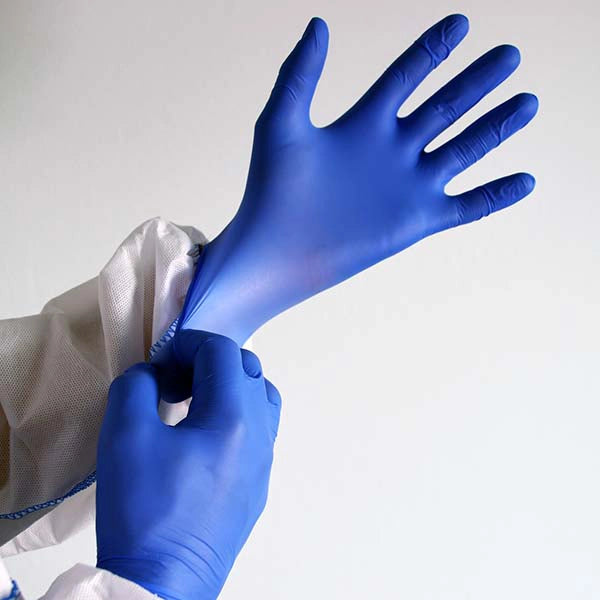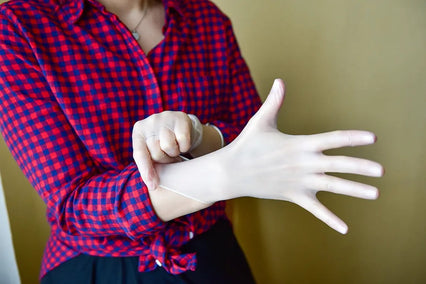For people with latex allergies and sensitive skin, disposable gloves made from synthetic materials, such as vinyl gloves, can seem heaven-sent. However, are you totally free from any dryness, rashes, or itchiness when wearing vinyl gloves? Can vinyl gloves cause allergic reactions? Learn all about vinyl glove allergy and more today!
What Are Vinyl Gloves?
Vinyl gloves are made from a synthetic material called polyvinyl chloride or PVC, a type of petroleum film. Plasticizers are generally added in the manufacturing process to make them more pliable.
These gloves are often used in the food industry because vinyl is a good barrier to prevent the transfer of light chemicals, food products, detergents, dyes, bodily fluids, and microorganisms. These disposable safety gloves have good strength at a low cost. They’re easy to use, with a low risk of injury. PVC is also waterproof, keeping your hands dry while working.
Disposable vinyl gloves are less widely used in medical or dental establishments. They’re less durable than latex gloves, and they lack some of the flexibility that’s necessary for medical and dental procedures. Vinyl also isn’t very puncture or tear resistant compared to other kinds of disposable gloves.
But vinyl gloves are a perfect alternative to latex gloves from an allergy safety perspective. Vinyl gloves are 100% latex-free. They’re also highly cost-effective, making them easy to replace. That doesn’t mean a vinyl glove allergy is impossible — some people do experience them. But if you’re wearing vinyl gloves, allergy symptoms are very unlikely.
Can You Be Allergic To Vinyl Gloves?
It’s possible to have a vinyl glove allergy, but it’s very rare because the materials used are man-made and synthetic. Allergic reactions to chemical accelerators or latex are far more common. Most people who think they have “vinyl gloves allergies” aren’t actually allergic to PVC.
That being said, some people do experience glove allergy symptoms. But are they caused by wearing vinyl synthetic gloves?
Vinyl Allergy Symptoms
Some vinyl gloves allergy symptoms include redness and swelling right after contact with vinyl gloves. However, vinyl gloves allergy symptoms vary from person to person and can include swelling, burning, redness, blisters, and cracks. The skin which contacts the vinyl gloves can also change from dark brown to purple depending on the skin’s sensitivity.
Vinyl gloves allergy symptoms typically appear within minutes to hours after exposure. Usually, they’ll disappear within 24 hours. If not, consult your doctor.
Types of Potential Allergic Reactions to Vinyl Gloves
There are 3 main types of vinyl gloves allergic reactions, namely:
- Non-Allergenic Irritation: A result of repeated use of vinyl gloves. To treat it, wash your hands with gentle soap and give your hands a break from wearing disposable gloves for a few days. This is the most common and least serious type of reaction.
- Type IV Hypersensitivity: Causes allergic contact dermatitis, like itching, dryness, scaling, skin lesions, and rashes. The vinyl glove allergy symptoms typically appear up to 48 hours after initial wearing.
- Type I Hypersensitivity: Results from a serious allergy to a glove component — fortunately, this is extremely rare. Can cause severe itches, conjunctivitis, urticaria (hives), and cramps. In extreme cases, vinyl glove allergy symptoms can lead to tremors, chest pains, anaphylactic shock, or even death. Vinyl glove allergy symptoms can appear within 30 minutes after initial direct contact.
Causes of Allergic Reactions to Vinyl Gloves
The main cause of disposable glove irritation is the lack of breathability and additives. In this case, we’re not dealing with a true allergic reaction. Instead, the user’s hands sweating inside the gloves can lead to skin irritation.
If you do have an allergic reaction to vinyl gloves, the most likely type is contact urticaria, a type of hives. It’s typically caused by other additives and chemicals added to the PVC in your gloves, not PVC itself. Many of these substances are accelerators used to speed up the chemical reactions involved in rubber production.
Substances often used by vinyl glove manufacturers include:
- Carba mix
- Dialkyl thioureas
- Thiuram mix
- Mercaptobenzothiazole (MBT)
- Black rubber mix
Some people who aren’t allergic to PVC may have sensitivities to these chemicals, which can cause skin irritation that may be attributed to “vinyl glove allergies”. To prevent this from happening, some companies have developed accelerator-free vinyl gloves.
Also, many manufacturers produce vinyl gloves and latex gloves in the same facility. This can lead to cross-contamination, resulting in skin irritation and allergic reactions.
Petroleum is also used in the manufacturing process of vinyl gloves and can be the source of an allergic reaction. While it is extremely uncommon, it may occur in some people.
Another type of reaction may be from leakage. If disposable vinyl gloves are worn too long, the material may start to break down and become more permeable. This can allow contact with chemicals and other irritants on the skin. When this happens, it doesn’t mean you have an allergy to vinyl gloves — you’re allergic to something in the environment.
Vinyl Gloves vs Other Glove Materials
There are different types of disposable gloves, but the most popular are latex gloves, vinyl gloves, and nitrile gloves.
Latex gloves are made from natural latex rubber and have been used for decades in the medical, dental, and food industries. They are comfortable, affordable, and highly durable. Nitrile gloves are more durable and offer superior chemical resistance.
Compared to latex and nitrile gloves, vinyl disposable gloves are less durable, stretchy, and comfortable to wear. However, they’re often more cost-effective, and they’re 100% latex-free. If you are searching for an alternative to latex gloves and are not exposed to chemicals or bodily fluids, vinyl gloves are great options. If you handle hazardous chemicals, nitrile gloves are a better alternative.
But remember, nitrile gloves can contain accelerators and plasticizers which can cause skin irritation and allergic reactions. And unlike nitrile gloves, vinyl gloves don’t have any chemical accelerators making them a better option for those with sensitive skin.
Prevention and Management of Allergic Reactions
The best remedy for hand allergies is to prevent them from happening. Remember to replace gloves regularly. Remove them immediately if your hands feel sweaty. Wash your hands thoroughly with mild soap and allow them to dry completely. Replace gloves every time you notice a puncture or tear.
Avoid wearing wet gloves and do not wear gloves when your hands are moist. Also, try using a cotton inner liner. Make sure your gloves are not too small or tight. This may cause discomfort by not allowing enough air to your skin.
Sweat-absorbing cloth liners, which can be incorporated into the gloves or worn separately under disposable gloves, can help minimize risk. However, adding liners thickens hand coverage and may reduce mobility. This can reduce work efficiency if hand movement is required for your tasks.
This is one of the main reasons why people prefer wearing thin disposable gloves. If you handle strong chemicals or are exposed to bodily fluids, skip vinyl gloves and go for nitrile gloves or latex gloves, instead.
What if you do experience a reaction to vinyl gloves?
The best vinyl glove allergy treatment is to just take off the gloves. Most reactions are very mild and solved by simply removing the gloves and washing hands. Contact urticaria can also be treated with antihistamines.
Vinyl Glove Allergy Options
Here are two types of vinyl glove options for those who experience an allergic reaction:
- Powder-Free Gloves. Powder free vinyl gloves are free from any traces of powder. Glove powder can cause skin and airborne irritation while contaminating surfaces in the workplace. It may also cause hand eczema to flare up as well.
- Accelerator-Free Gloves. Accelerator free gloves do not contain chemical accelerators. The most common irritation that occurs with vinyl gloves is caused by chemical allergies. Sensitivity to accelerators used in manufacturing can cause skin irritation. Accelerator free gloves removes that risk.
Shop Quality Vinyl Gloves from gloves.com
Can vinyl gloves cause allergic reactions? They are rare and uncommon. However, it’s best to always check the ingredients and materials used to make your vinyl gloves. If you need quality and durable vinyl gloves, check out our collection of vinyl gloves.
We sell the best gloves for sensitive skin. We source all our vinyl gloves from reputable manufacturers to ensure their durability, strength, and safety. Order affordable and high-quality vinyl gloves from a trusted store, gloves.com. Get yours today!
Vinyl Gloves Allergy: Frequently Asked Questions
Why do vinyl gloves give me a rash?
Even though it's rare, vinyl gloves can cause a rash or another allergic reaction because of the additives and chemicals added to the main ingredient, PVC. If you are experiencing skin rashes after wearing vinyl gloves, remove your disposable gloves and wash your hands with mild soap. Let your skin and hands recover and don’t wear any gloves for a while.
What type of gloves can cause allergic reactions?
Any type of gloves can cause allergic reactions in sensitive people, but it’s far more common with latex gloves than other types. These disposable gloves are made from natural rubber, which can cause immune reactions. Also, the cornstarch in powdered latex gloves can cause additional skin irritation and discomfort. If you have latex allergies, nitrile allergies or sensitive skin, look for latex-free alternatives to avoid any discomfort and allergic reactions.
Are vinyl gloves toxic to skin?
No, vinyl gloves are not toxic to the skin. Vinyl gloves can be a better option for people with sensitive skin, especially if they don’t contain any chemical accelerators.
Are vinyl gloves safe?
Vinyl gloves are safe for most people, but a very small number of people may suffer from contact urticaria from hand sweating or skin irritation caused by chemicals or other substances leaking through a torn glove.
Although vinyl gloves protect the hands against a range of irritants and chemicals, they can begin to leak if worn for too long. Also, they should not be used in direct contact to stronger chemicals.





